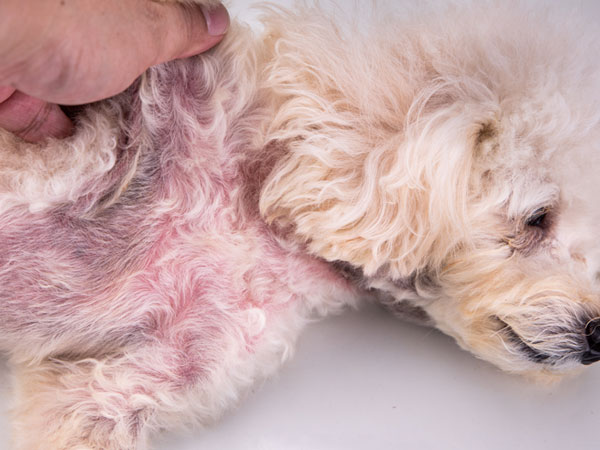Seborrheic & Breed Disorders in Pets
Seborrheic and breed-specific skin disorders are common causes of chronic skin problems in dogs and cats, often resulting in flaky, oily, or itchy skin. These conditions can be frustrating for pet owners and uncomfortable for pets, but with expert care from an animal dermatologist, they can be effectively managed to improve skin health and quality of life.

What Is Seborrheic Dermatitis?
Seborrheic dermatitis is a condition characterized by abnormal production of skin oils (sebum) and accelerated skin cell turnover. This leads to:
- Flaky or scaly skin (dandruff)
- Oily or greasy coat
- Itching and redness
- Odor due to secondary infections
Seborrhea can be primary (inherited) or secondary, caused by underlying issues such as allergies, infections, hormonal disorders, or parasites.
Primary vs. Secondary Seborrhea
- Primary Seborrhea is a genetic disorder often seen in specific breeds, causing chronic oily and scaly skin from a young age. It is lifelong and requires ongoing management.
- Secondary Seborrhea results from other skin or systemic diseases like allergies, hypothyroidism, or infections. Treating the underlying cause usually improves seborrheic symptoms.
Breed-Specific Skin Disorders
Certain dog and cat breeds are predisposed to unique dermatological conditions that require specialized care by animal dermatologists. Examples include:
Canine Sebaceous Adenitis
Common in Standard Poodles, Akitas, and Samoyeds, this autoimmune disease destroys sebaceous glands leading to dry, flaky skin and hair loss.
Color Dilution Alopecia
Seen in breeds with dilute coat colors (like blue Dobermans or Weimaraners), this inherited disorder causes hair thinning, hair shaft abnormalities, and skin infections.
Nasal Solar Dermatitis
Breeds with lightly pigmented noses such as Dalmatians and Bull Terriers are prone to sun-induced skin damage on the nose, which can lead to sores or cancer.
Cat-Specific Disorders
Breeds like the Devon Rex and Sphynx often have unique skin sensitivities and disorders such as hereditary seborrhea or fungal infections requiring expert management.

Diagnosis of Seborrheic & Breed Disorders
Accurate diagnosis requires a thorough approach by an animal dermatologist, including:
- Detailed history: Onset, breed, diet, environment, and previous treatments.
- Skin examination: Identifying patterns of scaling, oiliness, and lesions.
- Skin scrapings and cytology: To detect secondary infections or parasites.
- Biopsy: Skin biopsies can confirm inherited or autoimmune disorders.
- Blood tests: To rule out hormonal or systemic causes.
Diagnosis is essential to tailor an effective treatment plan that addresses both symptoms and root causes.
Treatment & Management
Medical Treatments
- Medicated shampoos and conditioners: To reduce scaling, oiliness, and soothe irritation.
- Topical therapies: Including anti-inflammatory and antimicrobial agents.
- Systemic medications: Immunosuppressants or antibiotics when needed for autoimmune or secondary infections.
- Nutritional support: Essential fatty acids and supplements to improve skin barrier health.
Long-Term Management
Seborrheic and breed-related skin disorders often require lifelong care. Regular follow-ups with an animal dermatologist ensure:
- Adjustment of treatments to maintain control
- Early detection of secondary infections or complications
- Guidance on skincare routines and environmental modifications
Why Choose an Animal Dermatologist?
Animal dermatologists specialize in complex skin diseases beyond general veterinary care. Their expertise allows:
- Identification of subtle breed-specific disorders often missed by general practitioners
- Advanced diagnostic techniques, including biopsies and genetic testing
- Personalized treatment plans combining dermatology and immunology
- Comprehensive long-term management for chronic skin conditions
Partnering with an animal dermatologist provides your pet with the best chance for healthy skin and a comfortable life.
Frequently Asked Questions (FAQs)
Is seborrhea contagious to other pets?
No, seborrheic dermatitis is not contagious. It is either a genetic condition or secondary to internal issues.
Can seborrhea be cured?
Primary seborrhea is a lifelong condition that requires ongoing management, while secondary seborrhea often improves with treatment of the underlying cause.
How often should medicated shampoos be used?
Frequency varies depending on the condition but typically ranges from weekly to monthly. Your animal dermatologist will provide a personalized schedule.
Are breed-specific disorders hereditary?
Yes, many breed-specific skin disorders are inherited. Early diagnosis helps manage symptoms and improve quality of life.
Can diet affect seborrheic or breed-related skin disorders?
Nutrition plays a vital role in skin health. Omega-3 fatty acids and balanced diets support skin barrier function and reduce inflammation.
Conclusion
Seborrheic and breed-specific skin disorders require specialized diagnosis and care to effectively manage chronic symptoms and improve your pet’s wellbeing. With expert guidance from an animal dermatologist, you can help your pet maintain healthier skin, reduce discomfort, and enjoy a better quality of life.
If your pet shows signs of flaky, oily, itchy skin, or breed-related dermatologic issues, consult an animal dermatology specialist for tailored care and long-term management.


